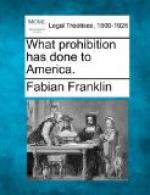was a cherished source of refreshment, recuperation,
and sociability, had any stake in the matter, the
agitators never for a moment acknowledged; if a man
stood out against Prohibition he was not the champion
of the millions who enjoyed drink, but the servant
of the interests who sold drink. This preposterous
fiction was allowed to pass current with but little
challenge; and many a public man who might have stood
out against the Anti-Saloon League’s power over
the ballot-box cowered at the thought of the moral
reprobation which a courageous stand against Prohibition
might bring down upon him. Thus the swiftness
with which the Prohibition Amendment was adopted by
Congress and by State Legislatures, and the overwhelming
majorities which it commanded in those bodies, is
no proof either of sincere conviction on the part
of the lawmakers or of their belief that they were
expressing the genuine will of their constituents.
As for individual conviction, the personal conduct
of a large proportion of the lawmakers who voted for
Prohibition is in notorious conflict with their votes;
and as for the other question, it has happened in State
after State that the Legislature was almost unanimous
for Prohibition when the people of the State had quite
recently shown by their vote that they were either
distinctly against it or almost evenly divided.
Of this kind of proceeding, Maryland presented an example
so flagrant as to deserve special mention. Although
popular votes in the State had, within quite a short
time, recorded strong anti-Prohibition majorities,
the Legislature rushed its ratification of the Eighteenth
Amendment through in the very first days of its session;
and this in face of the fact that Maryland has always
held strongly by State rights and cherished its State
individuality, and that the leading newspapers of
the State and many of its foremost citizens came out
courageously and energetically against the Amendment.
In these circumstances, nothing but a mean subserviency
to political intimidation can possibly account for
the indecent haste with which the ratification was
pushed through. It is interesting to note a subsequent
episode which casts a further interesting light on
the matter, and tends to show that there are limits
beyond which the whip-and-spur rule of the Anti-Saloon
League cannot go. In the session of the present
year, the Anti-Saloon League tried to get a State
Prohibition enforcement bill passed. Although
there was a great public protest, the bill was put
through the lower House of the Legislature; but in
the Senate it encountered resistance of an effective
kind. The Senate did not reject the bill; but,
in spite of bitter opposition by the Anti-Saloon League,
it attached to the bill a referendum clause.
With that clause attached, the Anti-Saloon League ceased
to desire the passage of the bill, and allowed it
to be killed on its return to the lower House of the
Legislature. Is this not a fine exhibition of
the nature of the League’s hold on legislation?




